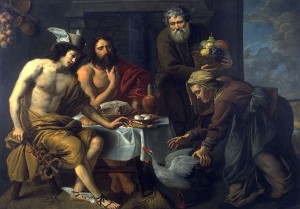Editors’ Note: This article is part of the Patheos Public Square on Immigration and Refugees. Read other perspectives here.
What does your faith perspective teach you about refugees? How do your politics and your religious convictions come together to inform policy and shape your attitude?
Every ancient pagan culture had very strong traditions of hospitality. These were often reinforced by telling stories of gods, goddesses, and angels disguised as mortals visiting people.
The Greeks had a strong tradition of xenia care for the stranger. This carried its own obligations and traditions. When Nausica found Odysseus washed up on the shore, her care for him was very much in the tradition of xenia.

The Hávamál, which means ‘the speech of the High One’ (Odinn) also contains stanzas about hospitality, and the duties of both host and guest.
Ultimately, the two words, host and guest, are derived from the same Indo-European root word, and so imply that they were viewed as inseparable parts of the same relationship. I like to think of them as the two halves of a hinge. The relationship of guest and host is reciprocal, with sacred obligations on both sides.
The concept and practice of hospitality are very important in India too, which suggests that the practice is very ancient indeed. Both Pakistan and Germany (and other places too) have the tradition of the guest-gift, where a guest will give you a gift the first time they visit your home. People from Latvia have a tradition of giving bead and salt as a gift when you have a new house. The sharing of bread and salt are considered sacred in many cultures. Once they have been shared, the relationship of guest and host is established and sacred.
If we think back to the times when small villages were scattered among great forests, the arrival of a stranger with news from other places, new stories, new songs, and new jokes, maybe even new farming or weaving or metalworking techniques, must have been very welcome.
There were also great movements of people in ancient times: Goths, Visigoths, Vandals, and Alans; settlers from the rest of Europe and North Africa who came with the Romans; Angles, Saxons, and Jutes who fled the rising waters of the North Sea and settled in Britain. More recently, there were silver miners from Germany who settled in the Mendips; many African and Middle Eastern people; the Huguenots fleeing persecution in France; Sephardic Jews from Amsterdam, Ashkenazi Jews from Eastern Europe, who began to arrive after the interdict against Jews was lifted in 1654 (it was put in place by King John in 1290 because he didn’t want to repay loans from Jewish bankers – who were forced to enter banking as other professions were closed to them).
Everyone in Britain probably has a refugee or an economic migrant in their ancestry somewhere, if you go back far enough. Even Kate Middleton is related to a prominent Huguenot family. And both refugees and economic migrants have contributed hugely to the UK by creating jobs and boosting the economy with their spending power and tax contributions (and if they are not from the EU, they have “no recourse to public funds” stamped in their visa – so they receive no benefits and no free NHS).
And in the US and Canada of course, unless you are 100% Native, you are an immigrant or descended from immigrants.
I feel instinctively that openness to other cultures, and welcoming the stranger and the refugee, are good things. What kind of civilisation would we be if we were not open and hospitable? One that was both ethically and culturally impoverished, would be my answer.
But I think that the gods and goddesses of Paganism – who frequently come to Earth to test the hospitality of mortals, and reward those who are hospitable, and punish those who are not – would agree that hospitality is a sacred practice and should be held in high honour.
Of course, in the case of migration to other lands, there is the point of transition from guest to resident. Here again, we see the process of reciprocity at work. The migrant has paid their tax, contributed work and money to the system, and in many cases their food style and folk customs to the culture, and so after a time they become a member of the community. In societies that welcome immigrants, such as Canada, this is expected and encouraged; and education has been geared towards welcoming diversity for the last 25 years. More xenophobic countries (such as the UK) go to extraordinary lengths to prevent the transition from guest to resident.
Both hospitality and reciprocity are Pagan virtues and have been since ancient times. Honour is also important in many Pagan traditions, and I think the honourable thing to do is to welcome the stranger. Hoarding wealth was frowned upon in ancient societies; wealth was displayed by the generosity of the ‘ring-giving lord’ who gave gold arm rings to his thegns, and the loaf-giver (hlaf-diga, the origin of the word lady). The social fabric was woven through the sacred practices of hospitality, fosterage, gift exchange, and reciprocity. We would do well to cultivate these virtues instead of xenophobia and suspicion. So I would definitely say that Pagan religions encourage us to show hospitality towards migrants and compassion for refugees.
See also:
















